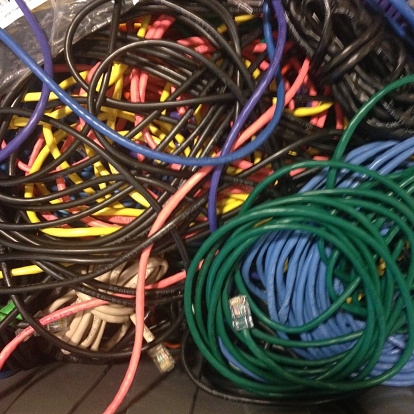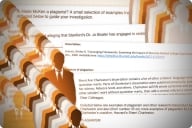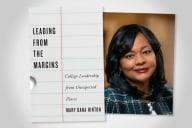You have /5 articles left.
Sign up for a free account or log in.

Getty Images
“Net neutrality” is an innocuous term for a concept that’s invoked heated debate both inside and outside academe. The idea that service providers must treat all internet data the same -- regardless of who’s using what content, or how -- has fierce proponents and critics, with the former championing the free exchange of ideas and the latter, the free market.
With the Trump administration planning to do away with Obama-era net neutrality rules endorsed by consumer groups (and many academics) and loathed by telecom companies, such discussions have reached a new pitch. The site of the latest academic flare-up is the International Journal of Communication, where an article with implications for net neutrality first appeared without a disclosure of funding from an industry group.
The authors of the paper say it was an accidental oversight that was quickly fixed. Their critics argue transparency is everything when it comes to research that’s already been cited by key policy makers.
“Academics depend on and are committed to the free circulation of knowledge, which net neutrality guarantees,” said Jeff Pooley, an associate professor of media and communication at Muhlenberg College who helped bring the lack of disclosure to light. He also co-authored a journal feature on it, which included a general critique of what he called the original paper’s “flimsy” arguments.
“The Curious Absence of Economic Analysis at the Federal Communications Commission: An Agency in Search of a Mission” was published this spring in the International Journal of Communication by Gerald R. Faulhaber, a professor emeritus of business economics and public policy at the University of Pennsylvania, and Hal J. Singer and Augustus H. Urschel of the consulting group Economists Incorporated. The paper argues that the Federal Communications Commission has, over time, moved away from using economic analysis in its decision making. It’s especially critical of the FCC’s 2015 Open Internet Order expanding net neutrality rules and classifying broadband internet as a public utility, and argues that a congressional mandate is the most direct way to “reinject” economic analysis into the body. While other federal agencies and departments perform rigorous cost-benefit analyses, the paper says, the FCC relies on “populism” as its guiding principle.
The article is adapted from a longer white paper previously submitted to the FCC by CALinnovates, a Silicon Valley-based tech advocacy group with ties to AT&T. It has argued against turning the internet into a utility on the grounds that it stifles innovation. CALinnovates funded the paper, but a disclosure did not appear with the journal article upon its initial publication.
Pooley and his collaborator, Dwayne Winseck, a professor of journalism and communication at Carleton University in Canada, noticed the oversight and alerted the authors and the journal. A basic footnote thanking CALinnovates for funding was added within two weeks, followed by a lengthier one noting that the paper was previously submitted to the FCC and appears on the website of CALinnovates.
Simple Mistake?
Faulhaber said this week that the fault was his: when he submitted the article to the journal, he stripped it of all identifying features for the blind peer-review process and simply forgot to put the funding footnote back in prior to publication. Both he and Singer, reached via telephone, denied that CALinnovates had any influence on their conclusions; moreover, they said, they’ve each documented their respective critiques of net neutrality in previous publications.
Singer also said that peer reviewers and others who did an internet search on the article would have immediately discovered the connection to CALinnovates, via the original white paper.
Faulhaber said of Pooley and Winseck, “They seem to be more interested in taking CALinnovates to task and using our paper as a vehicle.”
Pooley said he didn’t imagine the case was one of deliberate oversight, but that it mattered nonetheless, since it’s unlikely -- in his view -- that any funding disclosure would have been added without intervention. He and Winseck published a feature in the journal explaining their finding and pointing to a broader problem with business interests using academic research for “information laundering.” Their note also counters the original paper’s claim that economic analysis is not central to FCC decisions.
An “industry front group funded research that got published in a leading academic journal,” Pooley and Winseck wrote, noting that Ajit Pai, Trump’s appointed chairman to the FCC, has cited the CALinnovates-funded paper with no mention of CALinnovates itself. Pai also recently announced that the FCC will create an Office of Economics and Data.
“The paper’s core claim that the FCC has ‘abandon[ed] the dismal science,’ moreover, does not hold water,” they said. “We show that the record was stuffed full with the contributions of economists -- including those of the authors. The agency has been working in earnest to bolster, not sideline, economic analysis -- a conclusion in line with other researchers’ findings.”
Not Just Another Academic Disagreement
It might have been a fairly typical academic dispute, but Pooley said CALinnovates sent a series of emails to the journal and its home institution, the University of Southern California, describing his pending response as an “attack.” In the emails, lawyers for CALinnovates also alleged that Winseck failed to disclose his own ties to Google and Mozilla, which fund OpenMedia, a Canadian pro-net neutrality advocacy group with which he is affiliated.
“Please share the timeline for publication. Please identify all sources of Winseck and Pooley's funding,” a lawyer for CALinnovates wrote to the journal in one letter. “Should the required disclosures fail to have been made, we ask that the IJoC refuse to publish the paper. Should IJoC choose to move forward with publication regardless of the baseless attacks and lack of disclosures, we request that all nonacademic commentary regarding CALinnovates at-large be removed from the paper prior to publication.”
Another letter reads, “The IJoC’s Code of Ethics calls for the publication process to be ‘objective and fair.’ If the [note] is published in its entirety, we believe the IJoC will have fallen short of its stated ethics code.” (The authors refute that the affiliation amounts to anything of substance and say their paper was in no way financed by Google or Mozilla.)
A spokesperson for CALinnovates said Thursday that it "did express serious concerns with the initial paper it saw because it contained factual inaccuracies.”
Arlene Luck, managing editor of the journal, said via email that it received "pressure, including a letter from a libel attorney to the USC general counsel, regarding allegations of libelous statements in the reply." But Winseck and Pooley provided documentation for all of the challenged points, she said. In the end, one "small detail" was changed, as "although it conformed with a statement on the CALinnovates website, it seemed incorrect. Otherwise, the Winseck/Pooley reply was published without changes, other than those recommended by our peer reviewer and through standard copyediting."
The journal allowed both CALinnovates and the authors of the original article to publish responses to Pooley and Winseck.
The title of the CALinnovates piece, written by Mike Montgomery, executive director, kind of says it all: “Wrong, Unsupported and Irrelevant.” But here’s a bit more: “CALinnovates has long advocated for a third-way approach to solving this decade-long battle royale. From the beginning, CALinnovates has supported the principles of net neutrality. We believe net neutrality forms the foundation of free expression, competition, investment and economic prosperity online. But we have serious concerns about the foundation on which net neutrality currently teeters as well as the ongoing uncertainty of the regulation based on the whims of who is the FCC chairman at the time.”
Faulhaber, Singer and Urschel, meanwhile, wrote that a “brief hiccup prevented readers from seeing [the funding] disclaimer for a short period after its initial posting. To our knowledge, CALinnovates has not advocated an increased role for economics or the use of cost-benefit analysis at the FCC. Nevertheless, the repliers choose to devote much of the reply (six pages in total) to positions that CALinnovates has taken in past and current proceedings, none of which were even discussed in our article.”
High Stakes
Singer said he disapproved of “ad hominem attacks” included in Pooley and Winseck’s article, but Pooley said there’s nothing personal about the exchange. Rather, he said, it’s about shining a light on the net neutrality debate and rollback proposal (which includes a cost-benefit analysis at the FCC) before a public comment period ends July 17.
“I probably wouldn’t have devoted two months of my life to researching and [writing] this response if this had not been so pressing,” Pooley said, “or had the stakes not been so high.”









